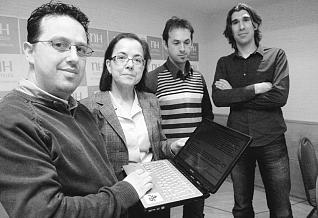
UT: What are your first impressions of Ä°stanbul?
MZ: My first impressions of the city, as I rode from the airport, were of the mild weather, and the densely populated hills. This is the most populous city I have visited, and it definitely “feels” as big as it is.
UT: Can your briefly tell us what did you present in FSF days?
MZ: I gave an overview of the Ubuntu project and its origins, then explained some of the challenges we face and how we meet them, and also a little bit about what is to come in the future of Ubuntu.
I understand that the talk was recorded, and a video will be made available at some point for people who could not attend the conference.
UT: Where do you see yourself in relation to Free Software and Open Source, now and in the past?
MZ: Before Canonical and Ubuntu, I was very active in the Debian project, which is where I first contributed to the free software community. Debian is where I learned how the free software world works, and continues to be very important to my work in Ubuntu as well. Professionally, I previously worked for a number of technology start-ups based in the US. In my work, I have always used free software, but Canonical has been my first opportunity to work for a company whose business is based on free software.
UT: What are the targets and the plans of Ubuntu project in five years?
MZ: Ubuntu is a vehicle for the expression of free software in people’s lives, so to some extent, the goals of Ubuntu are the goals of free software.
I think that free software must synthesize people’s experience of the web and the desktop. The divide between these two technological realms is limiting free software innovation by fragmenting the ecosystem. Along the way, we will need to resolve questions of freedom and autonomy on the web, and enable the community to embrace the web in ways which have not been possible yet.
We will also need to find ways to employ free software across a wide range of computing devices, not just traditional “computers” but handheld devices, entertainment appliances, and the like. People are doing more and more of their computing on these systems, rather than on PCs.
A key goal for Ubuntu specifically is to enable Canonical to become profitable, so that the Ubuntu project can continue to benefit from Canonical sponsorship.
UT: Ubuntu makes radical changes like moving the window buttons to the left side and removing Gimp from default applications. How do you decide those changes? Do you evaluate all relevant factors like the community’s opinion?
MZ: Decisions in Ubuntu are made in various ways, depending on the circumstances, and these two examples are quite different from each other.
In the case of GIMP, the decision was made by the desktop team. It is their responsibility to constantly reassess which desktop applications will provide the best experience for our users, and they do consider opinions from the user community both before and after these changes. In this case, they also consulted with the GIMP project themselves, who also support the change.
A key constraint for the desktop team is the size of the installation CD, and they must decide how best to use this limited resource. Their rationale was that GIMP is more suitable for complex graphics work, while most users require only basic functionality (such as cropping, resizing and so on). By encouraging users to download GIMP if they need it, they were able to free more space on the CD for applications which could benefit a greater range of people, such as the video application PiTiVi.
On the other hand, the decision to move the window buttons was made by Mark Shuttleworth. He explained that he wanted this in order to be able to use the space on the right side of the window for other things in the future. There have been many well-considered objections to this, both from users and from Ubuntu contributors, but he has decided to press ahead with the change anyway.
UT: Will Canonical make alliances with computer vendors for Ubuntu’s being at many computers, for instance are we going to see the computers that have been installed Ubuntu at Ubuntu Shop?
MZ: Canonical already does have such relationships with many computer vendors, particularly Dell, who have been very dedicated in their support for Linux and Ubuntu.
I do not expect that we will see computers in the Ubuntu shop, because Canonical’s expertise is not in manufacturing and selling computers. Instead, we work with OEMs to certify and customize Ubuntu for their computers, which they manufacture and sell through their own channels.
You can find a list of Canonical system builder partners at http://webapps.ubuntu.com/partners/system/ and a community-maintained list of vendors for Ubuntu computers at http://help.ubuntu.com/community/UbuntuPre-installed.
UT: Ubuntu One Music Store has been added to Ubuntu One project recently. What are your thoughts about Ubuntu One and the project’s goals?
MZ: I think that Ubuntu One has great potential to provide valuable services for Ubuntu users, and to help sustain the project by earning revenue for Canonical. The music store is a particularly exciting new service which is coming in the 10.04 release. The Ubuntu One team has done a great job in sourcing music without DRM restrictions for the benefit of our users. They haven’t been able to obtain popular music in Ogg Vorbis format yet, but we hope that this will become available at some point in the future.
UT: We have lots of ATI driver complaints. Does Canonical take steps in the direction of ATI drivers?
MZ: I can’t comment on the specific complaints without references. In general, we seek to provide our users with the best experience possible using the software and drivers suitable for inclusion in Ubuntu, and that certainly includes ATI. The ATI driver in Ubuntu 10.04 has gone through many revisions in order to fix bugs and provide support for a wide range of hardware.
UT: Do you have plans for cell phones? In after days, are we going to play music and videos or view pictures that we have transferred to the cloud from our computers by connecting to Ubuntu One account?
MZ: We recognize that people do more and more of their computing on mobile devices, and are exploring ways to provide a good mobile experience for Ubuntu users. For example, we just released an (open source) iPhone application which will synchronize your contacts between Ubuntu and the iPhone via Ubuntu One.
UT: Linus Torvalds has said that Linux kernel is getting bloated day by day and losing its performance, and Red Hat refused that claim. What does Canonical think?
MZ: I think that the Linux kernel meets the needs of Ubuntu users very well overall. Performance is important to our users, but not as important as some other considerations, such as having device drivers for their hardware.
UT: Richard M. Stallman had criticized Miguel de Icaza for his participation to Open Source Lab which has been founded by Microsoft. What do you think about that? And in the context of this subject how do you evaluate Mono Project.
MZ: Miguel and I have met, but I don’t know him well enough to comment on his motivation for doing this work. I don’t know that Richard does either. I will say that I think it’s shameful when members of our community are publicly attacked in this way, rather than opening a dialog to discuss the problem and its resolution.
With regard to Mono, I think it is a valuable piece of free software for us to have. However, there are risks involved in choosing the .NET platform to develop free software, because it is under the ultimate control of Microsoft. Microsoft could take advantage of this to attack free software in various ways. This would be a logical act of self-preservation, and consistent with their previous actions and statements of intent.
[Discuss the Ubuntu Turkey Team Interviews Canonical CTO, Matt Zimmerman on the Forum]
Originally posted by Yayin Tarihi here on Fri Apr 16, 2010



